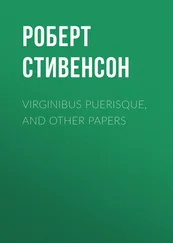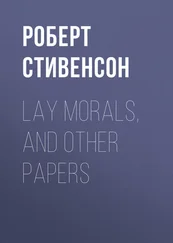Роберт Стивенсон - Familiar Studies of Men and Books
Здесь есть возможность читать онлайн «Роберт Стивенсон - Familiar Studies of Men and Books» — ознакомительный отрывок электронной книги совершенно бесплатно, а после прочтения отрывка купить полную версию. В некоторых случаях можно слушать аудио, скачать через торрент в формате fb2 и присутствует краткое содержание. Жанр: foreign_home, literature_19, на английском языке. Описание произведения, (предисловие) а так же отзывы посетителей доступны на портале библиотеки ЛибКат.
- Название:Familiar Studies of Men and Books
- Автор:
- Жанр:
- Год:неизвестен
- ISBN:нет данных
- Рейтинг книги:3 / 5. Голосов: 1
-
Избранное:Добавить в избранное
- Отзывы:
-
Ваша оценка:
- 60
- 1
- 2
- 3
- 4
- 5
Familiar Studies of Men and Books: краткое содержание, описание и аннотация
Предлагаем к чтению аннотацию, описание, краткое содержание или предисловие (зависит от того, что написал сам автор книги «Familiar Studies of Men and Books»). Если вы не нашли необходимую информацию о книге — напишите в комментариях, мы постараемся отыскать её.
Familiar Studies of Men and Books — читать онлайн ознакомительный отрывок
Ниже представлен текст книги, разбитый по страницам. Система сохранения места последней прочитанной страницы, позволяет с удобством читать онлайн бесплатно книгу «Familiar Studies of Men and Books», без необходимости каждый раз заново искать на чём Вы остановились. Поставьте закладку, и сможете в любой момент перейти на страницу, на которой закончили чтение.
Интервал:
Закладка:
He relieved himself in verse; but for such a smarting affront manuscript poetry was insufficient to console him. He must find a more powerful remedy in good flesh and blood, and after this discomfiture, set forth again at once upon his voyage of discovery in quest of love. It is perhaps one of the most touching things in human nature, as it is a commonplace of psychology, that when a man has just lost hope or confidence in one love, he is then most eager to find and lean upon another. The universe could not be yet exhausted; there must be hope and love waiting for him somewhere; and so, with his head down, this poor, insulted poet ran once more upon his fate. There was an innocent and gentle Highland nursery-maid at service in a neighbouring family; and he had soon battered himself and her into a warm affection and a secret engagement. Jean’s marriage lines had not been destroyed till March 13, 1786; yet all was settled between Burns and Mary Campbell by Sunday, May 14, when they met for the last time, and said farewell with rustic solemnities upon the banks of Ayr. They each wet their hands in a stream, and, standing one on either bank, held a Bible between them as they vowed eternal faith. Then they exchanged Bibles, on one of which Burns, for greater security, had inscribed texts as to the binding nature of an oath; and surely, if ceremony can do aught to fix the wandering affections, here were two people united for life. Mary came of a superstitious family, so that she perhaps insisted on these rites; but they must have been eminently to the taste of Burns at this period; for nothing would seem superfluous, and no oath great enough, to stay his tottering constancy.
Events of consequence now happened thickly in the poet’s life. His book was announced; the Armours sought to summon him at law for the aliment of the child; he lay here and there in hiding to correct the sheets; he was under an engagement for Jamaica, where Mary was to join him as his wife; now, he had “orders within three weeks at latest to repair aboard the Nancy , Captain Smith;” now his chest was already on the road to Greenock; and now, in the wild autumn weather on the moorland, he measures verses of farewell: —
“The bursting tears my heart declare;
Farewell the bonny banks of Ayr!”
But the great master dramatist had secretly another intention for the piece; by the most violent and complicated solution, in which death and birth and sudden fame all play a part as interposing deities, the act-drop fell upon a scene of transformation. Jean was brought to bed of twins, and, by an amicable arrangement, the Burnses took the boy to bring up by hand, while the girl remained with her mother. The success of the book was immediate and emphatic; it put £20 at once into the author’s purse; and he was encouraged upon all hands to go to Edinburgh and push his success in a second and larger edition. Third and last in these series of interpositions, a letter came one day to Mossgiel Farm for Robert. He went to the window to read it; a sudden change came over his face, and he left the room without a word. Years afterwards, when the story began to leak out, his family understood that he had then learned the death of Highland Mary. Except in a few poems and a few dry indications purposely misleading as to date, Burns himself made no reference to this passage of his life; it was an adventure of which, for I think sufficient reasons, he desired to bury the details. Of one thing we may be glad: in after years he visited the poor girl’s mother, and left her with the impression that he was “a real warm-hearted chield.”
Perhaps a month after he received this intelligence, he set out for Edinburgh on a pony he had borrowed from a friend. The town that winter was “agog with the ploughman poet.” Robertson, Dugald Stewart, Blair, “Duchess Gordon and all the gay world,” were of his acquaintance. Such a revolution is not to be found in literary history. He was now, it must be remembered, twenty-seven years of age; he had fought since his early boyhood an obstinate battle against poor soil, bad seed, and inclement seasons, wading deep in Ayrshire mosses, guiding the plough in the furrow wielding “the thresher’s weary flingin’-tree;” and his education, his diet, and his pleasures, had been those of a Scotch countryman. Now he stepped forth suddenly among the polite and learned. We can see him as he then was, in his boots and buckskins, his blue coat and waistcoat striped with buff and blue, like a farmer in his Sunday best; the heavy ploughman’s figure firmly planted on its burly legs; his face full of sense and shrewdness, and with a somewhat melancholy air of thought, and his large dark eye “literally glowing” as he spoke. “I never saw such another eye in a human head,” says Walter Scott, “though I have seen the most distinguished men of my time.” With men, whether they were lords or omnipotent critics, his manner was plain, dignified, and free from bashfulness or affectation. If he made a slip, he had the social courage to pass on and refrain from explanation. He was not embarrassed in this society, because he read and judged the men; he could spy snobbery in a titled lord; and, as for the critics, he dismissed their system in an epigram. “These gentlemen,” said he, “remind me of some spinsters in my country who spin their thread so fine that it is neither fit for weft nor woof.” Ladies, on the other hand, surprised him; he was scarce commander of himself in their society; he was disqualified by his acquired nature as a Don Juan; and he, who had been so much at his ease with country lasses, treated the town dames to an extreme of deference. One lady, who met him at a ball, gave Chambers a speaking sketch of his demeanour. “His manner was not prepossessing – scarcely, she thinks, manly or natural. It seemed as if he affected a rusticity or landertness , so that when he said the music was ‘bonnie, bonnie,’ it was like the expression of a child.” These would be company manners; and doubtless on a slight degree of intimacy the affectation would grow less. And his talk to women had always “a turn either to the pathetic or humorous, which engaged the attention particularly.”
The Edinburgh magnates (to conclude this episode at once) behaved well to Burns from first to last. Were heaven-born genius to revisit us in similar guise, I am not venturing too far when I say that he need expect neither so warm a welcome nor such solid help. Although Burns was only a peasant, and one of no very elegant reputation as to morals, he was made welcome to their homes. They gave him a great deal of good advice, helped him to some five hundred pounds of ready money, and got him, as soon as he asked it, a place in the Excise. Burns, on his part, bore the elevation with perfect dignity; and with perfect dignity returned, when the time had come, into a country privacy of life. His powerful sense never deserted him, and from the first he recognised that his Edinburgh popularity was but an ovation and the affair of a day. He wrote a few letters in a high-flown, bombastic vein of gratitude; but in practice he suffered no man to intrude upon his self-respect. On the other hand, he never turned his back, even for a moment, on his old associates; and he was always ready to sacrifice an acquaintance to a friend, although the acquaintance were a duke. He would be a bold man who should promise similar conduct in equally exacting circumstances. It was, in short, an admirable appearance on the stage of life – socially successful, intimately self-respecting, and like a gentleman from first to last.
In the present study, this must only be taken by the way, while we return to Burns’s love affairs. Even on the road to Edinburgh he had seized upon the opportunity of a flirtation, and had carried the “battering” so far that when next he moved from town, it was to steal two days with this anonymous fair one. The exact importance to Burns of this affair may be gathered from the song in which he commemorated its occurrence. “I love the dear lassie,” he sings, “because she loves me;” or, in the tongue of prose: “Finding an opportunity, I did not hesitate to profit by it, and even now, if it returned, I should not hesitate to profit by it again.” A love thus founded has no interest for mortal man. Meantime, early in the winter, and only once, we find him regretting Jean in his correspondence. “Because” – such is his reason – “because he does not think he will ever meet so delicious an armful again;” and then, after a brief excursion into verse, he goes straight on to describe a new episode in the voyage of discovery with the daughter of a Lothian farmer for a heroine. I must ask the reader to follow all these references to his future wife; they are essential to the comprehension of Burns’s character and fate. In June, we find him back at Mauchline, a famous man. There, the Armour family greeted him with a “mean, servile compliance,” which increased his former disgust. Jean was not less compliant; a second time the poor girl submitted to the fascination of the man whom she did not love, and whom she had so cruelly insulted little more than a year ago; and, though Burns took advantage of her weakness, it was in the ugliest and most cynical spirit, and with a heart absolutely indifferent. Judge of this by a letter written some twenty days after his return – a letter to my mind among the most degrading in the whole collection – a letter which seems to have been inspired by a boastful, libertine bagman. “I am afraid,” it goes, “I have almost ruined one source, the principal one, indeed, of my former happiness – the eternal propensity I always had to fall in love. My heart no more glows with feverish rapture; I have no paradisiacal evening interviews.” Even the process of “battering” has failed him, you perceive. Still he had some one in his eye – a lady, if you please, with a fine figure and elegant manners, and who had “seen the politest quarters in Europe.” “I frequently visited her,” he writes, “and after passing regularly the intermediate degrees between the distant formal bow and the familiar grasp round the waist, I ventured, in my careless way, to talk of friendship in rather ambiguous terms; and after her return to – , I wrote her in the same terms. Miss, construing my remarks further than even I intended, flew off in a tangent of female dignity and reserve, like a mounting lark in an April morning; and wrote me an answer which measured out very completely what an immense way I had to travel before I could reach the climate of her favours. But I am an old hawk at the sport, and wrote her such a cool, deliberate, prudent reply, as brought my bird from her aerial towerings, pop, down to my foot, like Corporal Trim’s hat.” I avow a carnal longing, after this transcription, to buffet the Old Hawk about the ears. There is little question that to this lady he must have repeated his addresses, and that he was by her (Miss Chalmers) eventually, though not at all unkindly, rejected. One more detail to characterise the period. Six months after the date of this letter, Burns, back in Edinburgh, is served with a writ in meditatione fugæ , on behalf of some Edinburgh fair one, probably of humble rank, who declared an intention of adding to his family.
Читать дальшеИнтервал:
Закладка:
Похожие книги на «Familiar Studies of Men and Books»
Представляем Вашему вниманию похожие книги на «Familiar Studies of Men and Books» списком для выбора. Мы отобрали схожую по названию и смыслу литературу в надежде предоставить читателям больше вариантов отыскать новые, интересные, ещё непрочитанные произведения.
Обсуждение, отзывы о книге «Familiar Studies of Men and Books» и просто собственные мнения читателей. Оставьте ваши комментарии, напишите, что Вы думаете о произведении, его смысле или главных героях. Укажите что конкретно понравилось, а что нет, и почему Вы так считаете.












